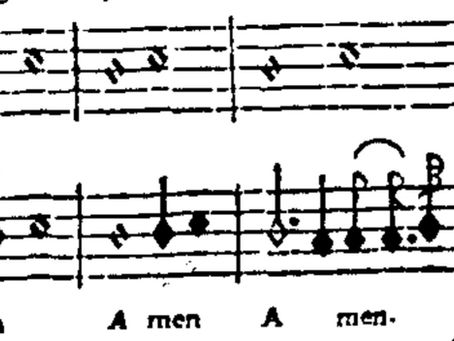top of page
Reimagining Historical Voices
Search


Thomas Elyot on Vociferation Exercises for Good Health (1595)
‘The chief exercise of the chest and vocal organs is “vociferation”, which is singing, reading, or crying [loud shouting], which has the...

Tim Braithwaite


William Byrd’s Reasons ‘to Perswade Every one to Learne to Sing’ (1588)
‘Reasons briefly set down by the author, to persuade everyone to learn to sing First, it is a knowledge easily taught, and quickly...

Tim Braithwaite


The Twenty Tests for Applicants for the Post of Choirmaster at Toledo Cathedral in 1604
'[Improvise] free [suelto] counterpoint on a plainsong in the bass, as well as concerted [counterpoint], showing two voices on the...

Tim Braithwaite


Charles Butler Complaining about the ‘Stentorian Vociferations’ of Choir Singers (1636)
‘First therefore let the whole choir endeavour to control their voices, so that the words may be clearly heard and understood by the...

Tim Braithwaite


Pietro Pontio on the Performance of Syncopations (1588)
‘Nonetheless there are others who are of the opinion that half of the note value of the syncopated semibreve is deemed to be dead—whereby...

Tim Braithwaite


Thomas Morley on the Embarrassment of being Unable to Sing a Part at Sight (1597)
‘But supper having ended, and music books having been brought to the table, according to the custom: the mistress of the house presented...

Tim Braithwaite


Fabio Orsini’s Manner of Recitation that was ‘not Completely that of one who is Reading’ (1488)
‘He then recited a heroic poem that he himself had previously written in honour of our Piero dei Medici. This [poem] was indeed his, and...

Tim Braithwaite


Andreas Ornithoparcus on the Singing of Different Nations and the Faults of German Cantors (1517)
Dowland’s Translation: ‘Every man lives after his owne humour; neither are all men governed by the same lawes, and divers Nations have...

Tim Braithwaite


Leonardo da Vinci on the Throat and the Muscles of the Leg (1510-11)
A. Begin the anatomy at the head and finish it at the soles of the feet. Put in all the exits that the veins make in the flesh and their...

Tim Braithwaite


Gioseffo Zarlino on Those who Improvise Counterpoint with ‘No Regard for the Other Voices’ (1558)
‘What Must be Observed when Improvising a Third Part on Two Given Parts: Skilled contrapuntists occasionally want to improvise a third...

Tim Braithwaite


An Anonymous Set of Instructions for Ornamenting Plainchant (c.1475-1525)
[fol. 22r.] Chapter two: of the definition and the division of melodía Melodía is to adorn and to grace the sounds of plainchant. Melodía...

Tim Braithwaite


Bovicelli on the Graceful Placement of Certain Syllables (1594):
‘As for the disposition of the words under the notes, it is necessary to take great care to set them so well, that not only no barbarism...

Tim Braithwaite


Bottrigari on both Ensemble Ornamentation and ‘Odious’ (‘odiosa’) Improvised Counterpoint (1594)
‘[Alemanno Benelli:] But because of the presumptuous audacity of performers who try to invent passaggi, I will not say sometimes, but...

Tim Braithwaite


Andreas Ornithoparcus (1516) on Solmisation:
(Summary) The Rules of Solfaing When solfaing, the singer must be aware of the mode of the piece, since this will tell them what sort of...

Tim Braithwaite


Thomas Morley on the Perils of Many Singers ‘Singing on a Plainsong.’
'As for singing upon a plainsong, it has been in times past in England, as every man knows, and is at this day in other places, the...

Tim Braithwaite


Coclico on Learning how to Improvise on a Plainchant (1552):
'Having learned these species [of intervals] and the method, here is how we ought to use them. The boy should provide himself with a...

Tim Braithwaite


The Practices of ‘Lascivious’ Church Musicians as Described by Heinrich von Nettesheim (1532)
‘Today, music has such great license in churches that even along with the canon of the mass certain obscene little ditties sometimes have...

Tim Braithwaite


Adrianus Petit Coclico on the Art of Singing as (Supposedly) Taught by Josquin Dez Prez (1552):
‘To teach the art of singing well and elegantly to a boy, I advise first that he choose a teacher who sings pleasantly and sweetly with a...

Tim Braithwaite


Banchieri on Writing an Introit that Creates the Effect of Improvised Counterpoint in Many Voices
‘I have no doubt at all that the counterpoints above a cantus firmus from the introits by Constanzo Porta and Giovanni Matteo Asola,...

Tim Braithwaite


Adriano Banchieri’s ‘Hundred Passaggi’:
‘The hundred passaggi above, all having been printed in various works by modern authors, have been assembled with much study and...

Tim Braithwaite
bottom of page
